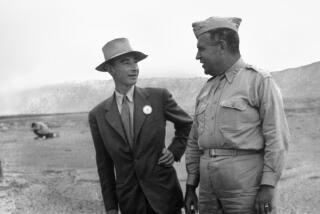Making a Case for Connection Between Science and Religion
- Share via
Whenever a debate on evolutionary biology arises, the popular rejoinder is almost inevitable: “It’s the old story of science versus religion.”
Not really true. Countless religious people are intellectually at home with evolution, and there are leading scientists, including Nobel laureates, who believe in a personal deity. This first came to mind some years ago when my wife, Althea, developed a course for Paul Obler’s interdisciplinary program at Cal State Fullerton on “The Science-Religion Dialogue.” A biologist by training, sculptor by profession, she had been inspired by Albert Einstein’s observation: “All religions, arts and sciences are branches of the same tree.”
The conflict is not between science and religion, but between a narrow group of adherents in each camp who maintain they have discovered the indisputable truth about how things occurred. Fundamentalism is a mind-set that tolerates no deviation from the established orthodoxy whether scientific or religious.
It is instructive that it was not just clerics who condemned Galileo’s cosmology in 1616, but also fellow scientists. Ignaz Semmelweis, a Hungarian physician, went insane in 1865, having witnessed scores of women dying of puerperal fever because he could not persuade fellow surgeons to wash their hands before surgery. His germ theory was too radical for their conservative taste.
Fundamentalists in all generations have adhered rigidly to their religious, scientific, or even economic and political theories and forced them on others. Thus the stoning of the prophets of ancient Israel, by the ultraconservatives of their time; the condemnation of Jesus by the Pharisees and Sadducees; the persecution of Muhammad by the entrenched leaders of his own Quraysh tribe. And who can forget the battles over the “divine right of kings,” or the rancor among socialists, capitalists and communists? True believers make bloody rivals.
Half a century ago, the Nobel-winning physicist Arthur Holly Compton, who was also an elder in the Presbyterian Church, brushed aside the fundamentalist notion of a conflict between science and religion: “Science can have no quarrel with a religion that postulates a God to whom [we] are as His children with free intelligent wills.”
About that time, Einstein published his book “Out of My Later Years,” in which he declared, “Science can only ascertain what is, but not what should be. Religion is the age-old endeavor to become clearly and completely conscious of these values and goals. If one conceives of religion and science according to these definitions, a conflict between them appears impossible.”
Charles Townes, after winning the Nobel Prize for his work on masers, insisted on the convergence of science and religion. “They both represent man’s efforts to understand his universe and must ultimately be dealing with the same substance.” The fact that both realms are so intimately related to mankind’s decision-making in every area of public and private life makes their cooperation all the more urgent.
Is this to suggest we abandon creeds, formulas and theories? Not according to the British writer Dorothy Sayers who, in her book, “Creed or Chaos?” points out that it was largely the loosening of religious beliefs that made the German people vulnerable to Fascism.
Creeds, notes Sayers, are valuable as road maps for life’s journeys. But maps must be subject to revision, as scientific formulas are constantly challenged and revised.
John Polkinghorne, a particle physicist and former president of Queen’s College, Cambridge, is also an ordained Anglican priest. He acknowledges that scientific and religious traditions offer differing views on humankind’s emergence on the scene of history. But he proposes that two major problems exist with evolution not yet accounted for. One is the sheer time scale. A time frame is critical for scientific verifiability.
A second difficulty is even more crucial. Why do things get more complex when the fundamental laws of physics propose that over time things get less so, run down, and finally cease to be?
If Darwinian theory is correct; only those mutations are retained which enhance survival. Why has the human brain developed to such vastly greater complexity than any other mammal’s? There is no clear survival value in solving quadratic equations or pondering the vastness of the universe.
Is there a purpose, and if so does this not suggest a Purposer? Physicist Ian Barbour’s observation upon winning the $1.3 million Templeton Foundation prize for 1999: “Many people see evolution as God’s way of creating.”






